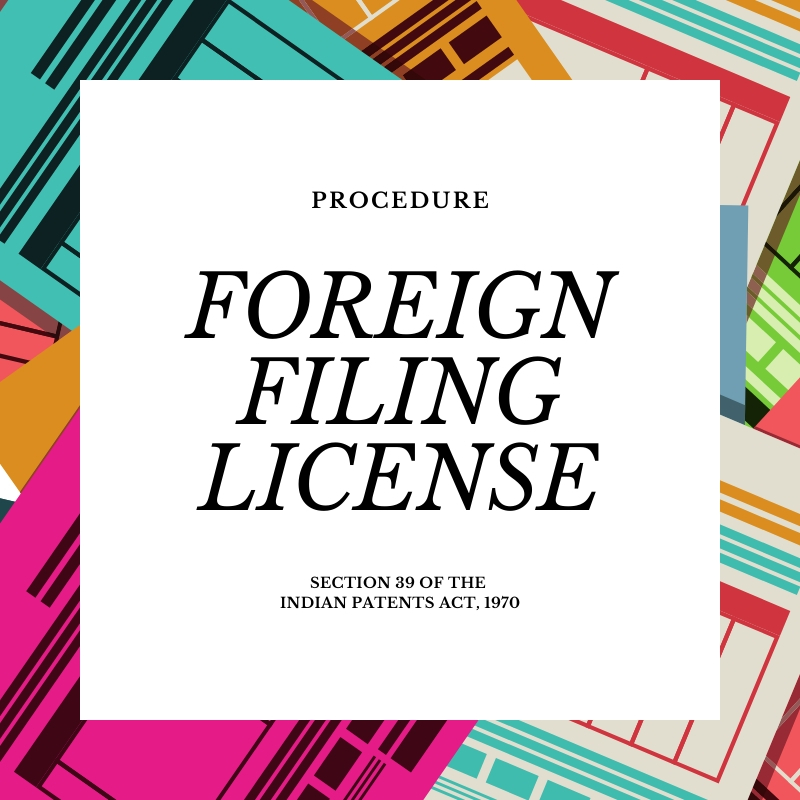Sometimes the Indian patent applicant (Company or Individual) may decide to file the patent application as an International patent application under PCT or file directly with the foreign Patent Office of their choice without filing their patent application in India first due to some reasons.
Sometimes an FFL is also procured when the patent application in India is already files and subsequent patent applications abroad need to be filed within 6 weeks of the Indian Application filing date.
According to Section 39 of the Indian Patents Act, 1970 it is mandatory for the applicants to secure a Foreign Filing License (FFL) in such cases from the Indian Patent Office.
It is mentioned in Sec 39 that:
39.Residents not to apply for patents outside India without prior permission— (1) No person resident in India shall, except under the authority of a written permit sought in the manner prescribed and granted by or on behalf of the Controller, make or cause to be made any application outside India for the grant of a patent for an invention unless—
(a) an application for a patent for the same invention has been made in India, not less than six weeks before the application outside India; and
(b) either no direction has been given under sub-section (1) of section 35 in relation to the application in India, or all such directions have been revoked.
(2) The Controller shall dispose of every such application within such period as may be prescribed:
Provided that if the invention is relevant for defence purpose or atomic energy, the Controller shall not grant permit without the prior consent of the Central Government.
(3) This section shall not apply in relation to an invention for which an application for protection has first been filed in a country outside India by a person resident outside India.
As mentioned above, an FFL is required only if the applicant is a resident of India at the time of filing of the Patent Application. It is important to understand here that the statute is mentioning about the residential status and not the nationality.
However, the Patents Act 1970 is silent about the definition of the term ‘Resident’.
The Indian Income Tax Act, 1961, however, defines the term ‘Resident’. According to Section 6 of the Indian Income Tax Act, 1961, an individual is said to be the resident of India, if:
(i) he is in that year (referred to as previous year, which commences from 1st April of a year and ends on 31st March of the next year) been in India for a period or periods amounting in all to 182 days or more; or
(ii) he has within the preceding four years (April-March years) been in India for period or periods in all amounting to 365 days or more and for 60 days or more in that year.
Every Indian company (registered under Companies Act, 1956) and every other company the control and management of whose affairs was situated wholly within India in that previous year is a resident of India.
The disposal of the FFL is done by the Controller within 21 days from the date of the filing of such a request. [Rule 71, The Patent Rules, 2003]
Documents required to file FFL:
– Form 25 with the prescribed fee – Request for Permission for making Patent Application outside India
– Disclosure of the invention along with drawings
– Name and address of the inventor(s)/applicant(s) who are the residents of India
– Name of the countries in which the invention would be filed and reason for making such an application
– Name and address of the assignee(s) (if any)
– Power of attorney from the inventor (s)/applicant(s) where a patent agent is appointed to represent them before the IPO.
The consequences of not applying for an FFL prior to filing a foreign application can be accessed here.
Alternatively, the Indian patent applicants can always take the direct and simpler route of first filing the patent application at IPO and wait for 6 weeks for filing patent applications in foreign jurisdictions to avoid the complexities of obtaining an FFL.
For more information, please contact us.




